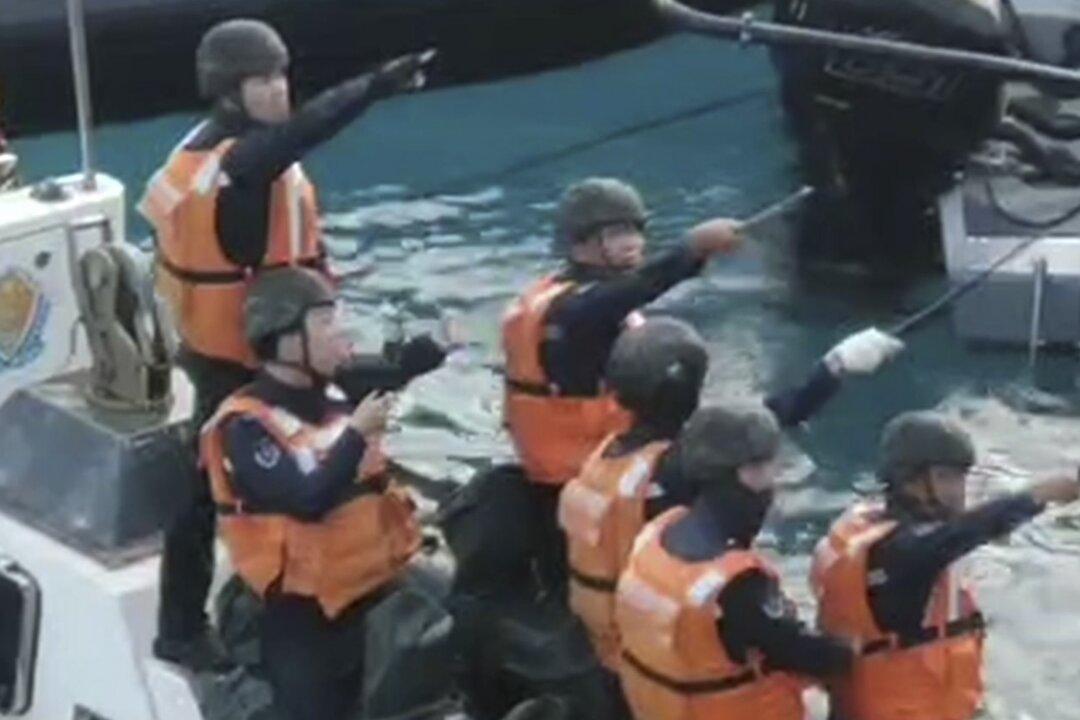Commentary
The hours-long clash on June 17 between Chinese coast guard personnel and Philippine navy personnel in the South China Sea was yet another Chinese Communist Party (CCP) attempt to disrupt the Filipino resupply of marines on the Second Thomas Shoal.
Chinese coast guard boats sped toward small inflatable Philippine naval vessels and allegedly rammed them. One of the Filipino crew, holding onto the side of his boat, lost a thumb. Chinese personnel seized two of the vessels. The Chinese brandished knives, machetes, spears, and an axe above their heads in unison. They slashed and stabbed at the Filipino boats, puncturing and deflating one rubber inflatable. They stole a backpack from the Filipinos and looted their firearms. In total, seven Filipino service members were injured. Manila denounced the incident as an “intentional ramming.”
The apparent attempt to menace the Philippines navy did not work. Instead of fighting back with similar weapons or the firearms they had on board, the Filipinos defended themselves bare-handed in a remarkable show of restraint. They took video evidence and later provided it to the international press.
In 1999, the Philippines purposefully grounded a decommissioned U.S. naval ship from World War II there. Called the BRP Sierra Madre, the rusted hulk has since been home to a small marine contingent and a symbol of the strength of small powers in the face of CCP aggression. The ship keeps the People’s Liberation Army (PLA) from establishing another of its many South China Sea bases and reinforces the Philippine claim to its embattled exclusive economic zone (EEZ).
In 2016, an international arbitrator in The Hague recognized the Philippine EEZ and declared the CCP’s “9-dash line” claim to almost the entire South China Sea as invalid. Beijing responded to the jurists by flying a nuclear-capable bomber over Scarborough Shoal, which is within the Philippine EEZ. The flight was a clear indication that the CCP is less interested in international law or communist equality—the Philippines has a lower GDP per capita than China—than in grabbing as much as it can, wherever it can. The CCP has proven itself, as it has repeatedly since the 1930s, as more of an empire builder and destroyer of diversity than as a good neighbor concerned about the development of countries on its periphery.
Recognizing the most recent Chinese interception as an “armed attack” would give cause to the Philippines to invoke its mutual defense treaty with the United States—something that Manila refused to do on June 21. Against all the available evidence, the palace instead called the incident “probably a misunderstanding or accident.” Nobody wants another war.
The United States, however, reiterated afterward that any attack by the CCP’s military forces, including its coast guard, on the Philippine navy or coast guard would count for purposes of the treaty. This is the minimum necessary to retain some semblance of deterrence in the South China Sea.
Philippine President Ferdinand “Bongbong” Marcos responded to the attack by saying that the Philippine nature is to solve problems through dialogue, not fighting. He said he would not invoke the U.S. treaty. Instead, Mr. Marcos visited the naval personnel involved in the clash to praise their bravery and restraint in the face of “intense provocation.” Mr. Marcos also showed laudable restraint, taking the win in the court of global public opinion.
Conversely, the CCP looks as bad as ever. Rather than help solve the global chaos caused by Russia, Iran, and other “axis of evil” members, it exploited it for gain. While Russia is attacking Ukraine and Iran is attacking Israel through proxies, Beijing hopes to grab an advantage over the Second Thomas Shoal. We are indeed distracted. The White House announced on June 20, in the context of continued nuclear threats by Russian President Vladimir Putin, the redirection of U.S. air defense interceptor missiles to Ukraine from shipments planned for other allies.
The South China Sea is important for nearly every country in the world, as more than $3 trillion worth of trade traverses its waters annually. It is the size of India and loaded with lucrative fishing and natural resources, including oil and gas. The sea is militarily strategic in that its many tiny islands and shoals shelter PLA naval forces and serve as air bases that extend the range of its bombers and rockets in the direction of, among other things, U.S. forces in Guam, Singapore, and Australia.
If the PLA could deny access to the United States to the South China Sea, it would be harder for the U.S. Navy to hem it in and interdict Chinese imports in case of war. Beijing could more easily exploit the oil and gas resources of the sea if, for example, war prevented it from importing energy from Russia, Iran, and Saudi Arabia. The CCP’s decision to maintain military pressure in the South China Sea is also a feint for Beijing’s military priority: the invasion of Taiwan.
That this aggression against the Philippines is not called an “armed attack” by Manila and Washington is yet another concession to Beijing. The CCP must be celebrating as Manila calls the incident both an “accident” and an “intentional ramming.” Whatever one calls it, the incident once again illustrates how the CCP abuses its power in yet another sad rejection of international norms.





